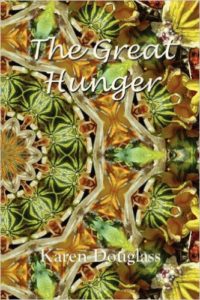The Great Hunger
 by Karen Douglass,
by Karen Douglass,
Plain View Press, 2009,
81 pages, paper, $13.46,
ISBN -10: 0 – 9818731- 6 – 6
Buy the Book
In her preface to her book of poems, The Great Hunger, Karen Douglass says, “We are eating ourselves and the world to death” (7). Her poems are windows on the ever – lengthening food chain to which we are shackled and they lead the reader from everyday views of our own kitchen tables and farmers’ markets to vantage points we may have trouble accessing — the plight of the undocumented migrant worker in the fields and or the picture of the entire world from above in which the poet traces the paths our food takes from field or pasture to our tables.
While she’s angry at Monsanto (22) and at having to “[forage] for crumbs from the wide vests of CEOs” (15), she acknowledges her own role — in fact, most of the collection rings with a shame at her own complicity in the processes she decries. While she appeals to our shared experiences, evoking the industry and connectedness one feels at a farmer’s market in, “Thirteenth Street Market” (64), even then there’s a desperation mingling with that sense of useful participation in a community: she’s not shopping just for her own table and her own salvation, but for ours as well — the health of the world and its citizens rests on the purchases she makes that Saturday morning. This fear of judgment marks her observations in “Bloodline” (14) as well as she considers how a processed existence is colorless, transporting the speaker further from nature. Here she leaves the end of the poem unpunctuated to suggest the unknown of what kind of an earth will be bequeathed to the next generation; eyes that see “the underside of things” are sealing the bloodline in a continual circle, not wishing to betray the white existence that began the poem.
This kind of thoughtful layering marks many of Douglass’ poems. “Dear Trout” (25) begins with a self – absorbed request to be fed and concludes just seven lines later with a supplication to the same fish she would have eaten, now asking him to teach her how to swim, acknowledging the natural world has much to tell us about living responsibly, usefully — encapsulating the concept in the economical, deliberate way she presents the poem. Although some of her language is a little shopworn,“gold coat[ing] the many roads to hell” (67), Douglass has other instruments in her arsenal to move her poems along as in “Value Added,” where the line breaks create a playful pace at which to trip through abstractions and images. And she is happy to use ironic humor to lighten the grim picture — in “I Want to Eat” (33), she writes that she wants “one raw carrot.” The reality of how unnatural the process by which she comes to that carrot is raw in itself and we continually encounter wordplay wrapped in a very alert conscience in these poems. But beyond her own sense of responsibility, Douglass displays both an uncertainty and thankfulness in “What’s Here” (69) that doesn’t appear in her other poems, illuminating yet another facet of our complex relationship with food.
The joy of this collection is in its variety — the specificity of salsa, the generality of supermarkets and mass -produced products. It is playful in its movement between subjects, but careful in its contemplation of the choices we must make, shedding a new and glaring light on how to decide what’s for dinner.
— Meghan Cadwallader

